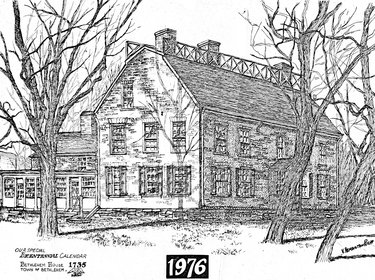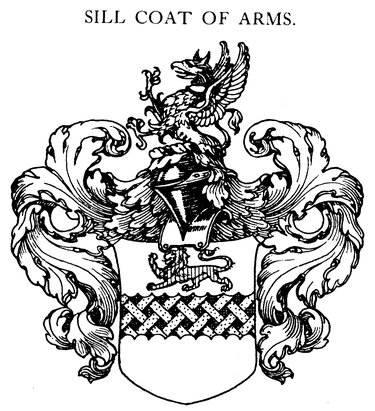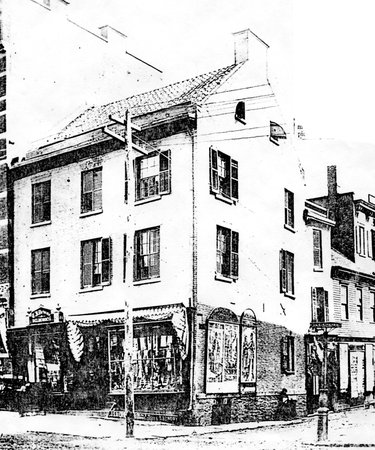Aaron Burr and Richard Sill were law partners
A one-time landmark at the corner of South Pearl Street and Norton Street in Albany held the law offices of Aaron Burr and Richard Sill in the rear of the building where Burr started a practice in the fall of 1781. Sill joined him the following year. The old two-story Dutch era building had a tiled roof. Several residences and businesses were in the site. It was demolished when the Benson Building was erected.
This entry was written 30 years ago in this author's journal of Sept. 6, 1984.
"I would never have believed I could spend so many hours going through old micro-filmed letters at the archives in the New York State Library. When I found a connection between Aaron Burr and a great-great (seven times) grandfather of mine it was like being handed a million dollars.”
Aaron Burr had a brilliant career as an officer in the Continental Army as a lieutenant colonel and made a name for himself engineering several battles. Later, he was in the New York State Legislature and lived in Albany on “Washington Street” near the State Capitol where the Fort Orange Club is today.
Major Richard Sill was from Lyme, Connecticut. Sill delivered the valedictory oration when he graduated from Yale University in 1774. Six months later, he joined the Connecticut Regiment of the Continental Army.
Sill's reports concerning events of several Revolutionary battles, the siege at Boston, and the disastrous winter at Valley Forge are on file in federal records.
After his military career, Sill lived in Cedar Hill, Bethlehem just outside of Albany after his marriage on May 2, 1785 to Elizabeth Nicoll, daughter of Colonel Francis Nicoll of that place. From that wedding, he became the seven-times great-grandfather of this author.
It was in the capacity as Army officers that Sill met Burr. Though in different regiments, they were both present at the Battle of Monmouth and the Battle of Long Island in 1776. Major Sill became a law partner with Aaron Burr in the 1780s.
The following letter, on file in the New York State Library Archives dated April 1785 written by Aaron Burr to his wife, Theodosia Provost Burr, tells of one of his visits to the Nicoll homestead on the outskirts of Albany:
"I arrived here on Tuesday evening very late, though little fatigued. Wednesday afternoon I went with Sill to Bethlehem (Nichols) sic, drank tea, supped and breakfasted. I am pleased with our friend’s choice, of which more next Tuesday evening... Affectionately adieu, A. Burr.”
Research finds a letter written by Major Sill to Aaron Burr telling him of his marriage to Elizabeth Nicoll that had taken place at the Cedar Hill mansion of her father in Bethlehem. "Only family in attendance," the letter stated.
Yet, that wasn't quite accurate as the wedding list showed many important people from Albany and surrounding cities had attended. General Phillip Schuyler, his wife, Catherine, and their daughters were among local notables at the wedding. Schuyler was Elizabeth Nicoll's uncle. His daughters, Margarette, Angela, and Betsy were Elizabeth's cousins and close friends.
Yet, a deciding factor in Burr not being invited to the wedding was that Burr had defeated "Uncle" Phillip in a close election for State Senator the previous year. Elizabeth's family —Sills, Nicolls, and Schuylers — were not pleased with Aaron Burr.
Five days after his wedding to Elizabeth Nicoll, Major Sill apparently felt obliged to inform his law colleague of the event.
In a letter dated May 7, 1785, Sill wrote, “My dear Sir, Before this letter will reach you, you will undoubtedly have been informed that I have ventured into the world of the unknown; last Monday, (Rev.) M. Westerlo united our hands but made no addition to the union of our hearts...
“I know you and Mrs. Burr will join with us in the sincerest joy of this occasion — My dear Betsy proposes me in this first instance to tender to you her warmest affections, she has for a long time been acquainted with the intimacy of our friendship — and will now meet you as a sister.
“You will congratulate Mrs. DeVisme on this occasion, and tell her that I think I have at length obtained as good a wife as she kindly has wished me...our little family arrangements are not yet made out, however I fancy we do not go to housekeeping before next Fall or Winter — until which time Betsy will divide her time between Town and Bethlehem. She is now in Town receiving her company. No one present at the ceremony but the family.
“Here I have given you a short history of the most material (sic) event which can ever befall me, as the step has been taken upon the fullest conviction of its propriety and what is infinitely more from the completest unions of heart. I have no doubt you will agree with me that our prospects for happiness are promising — your prayers will I am sure join ours when happiness is the theme.
“I was very unhappy at not seeing you at court, my heart was full of everything kind and clever. It would have been a luxury to spend an hour with you, which would have been exceeded only by the society of one person.
“The friends are as well united with us in sentiment as could be expected considering there is no royal blood on the one side. The parents receive me with all the affection and tenderness which the connection warrants — and in all stages of the acquaintance have treated the subject with all that candor and frankness which ever flows from honest hearts.
“I am with the finest affection, Richard Sill.”
A postscript refers to a business matter of bankbooks and laws. Then Sill thanked Burr for his previous letter and writes that he and Elizabeth would like to "come down" in summer or fall if it didn't interfere with a proposed visit to New England.
Aaron Burr and Richard Sill remained law partners until Major Sill died of consumption in June of 1792 after a short marriage of seven years to Elizabeth. They had two sons, William and John.
Burr left Albany and moved to an estate on the Hudson River in Richmond Hill, New York with his wife and daughter, both named Theodosia. He became vice president of the United States under President Thomas Jefferson in 1801.
Historian's note: There are many more interesting tales that can be written from the history archives on these historical figures. Is that this historian's fortune?


